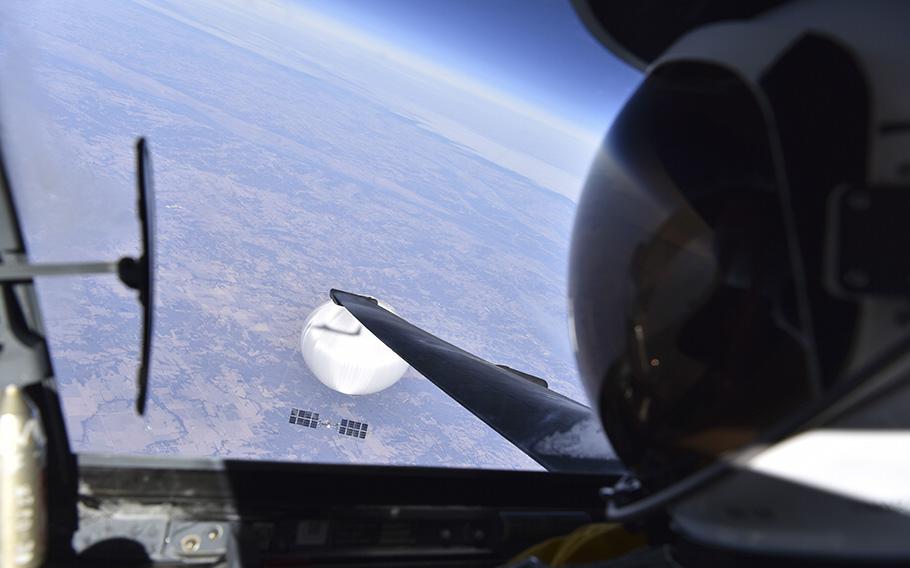
A U.S. Air Force pilot looks down at a Chinese surveillance balloon as it hovered over the central continental United States on Feb. 3, 2023. (Department of Defense)
High-level meetings this week between U.S. and Chinese officials suggests Beijing may be open to restarting dialogue, analysts say, after rebuffing American overtures for months after an alleged Chinese spy balloon was found hovering over the United States.
President Biden has been offering for months to talk to his Chinese counterpart, but Xi Jinping has not reciprocated. So this week's sudden flurry of meetings marks a change from Beijing in particular.
In previously unannounced talks on Wednesday and Thursday, U.S. national security adviser Jake Sullivan and China's top diplomat, Wang Yi, spoke for more than eight hours in Vienna. They had "candid, substantive, and constructive discussions" on key issues including the U.S.-China bilateral relationship, according to a readout from the White House.
In Beijing, Chinese Commerce Minister Wang Wentao met with U.S. Ambassador Nicholas Burns for what the later described as an "open and detailed discussion on the bilateral trade relationship." On Monday Burns and Chinese Foreign Minister Qin Gang met and spoke about the necessity of "stabilizing" Sino-U. S. relations.
The flurry of activity, the most senior level talks in months, comes as China continues a charm offensive in Europe and leverages recent diplomatic wins, from the brokering of Saudi-Iran ties to Beijing's growing partnership with Russia, to present itself as a credible global leader.
"In a moment when they are actively wooing the Europeans and trying to convince them to strike out a path that's independent of the United States in the way they deal with China, it's in their interest to project an image of responsibly managing the competition," said Amanda Hsiao, senior China analyst at the Crisis Group think tank.
Qin was in Berlin, Paris and Oslo this week for talks. China's special representative for Eurasian affairs, Li Hui, a senior diplomat who previously served as ambassador to Moscow, will travel to Ukraine, Poland, France, Germany and Russia starting Monday, according to an announcement by China's Ministry of Foreign Affairs on Friday.
There were glimmers of hope at the end of last year, after Biden met Xi in Bali in November, that the relationship between the world's two largest economies might be improving.
But that all came to a halt when U.S. authorities in February detected a high-altitude Chinese balloon equipped with surveillance capabilities floating over the United States. Secretary of State Antony Blinken, due to visit Beijing to build on the Biden-Xi meeting, canceled his trip and most channels for working-level dialogue were frozen.
Since then China has cold-shouldered Washington while trying to burnish its image as an alternative global leader able to mediate international crises like Ukraine. After releasing a peace plan largely in line with Moscow's stance, Xi spoke with Ukrainian President Volodymyr Zelensky by phone in April.
At the same time, China has struggled under U.S. curbs on technology exports and watched as U.S. officials continue to engage its rival, Taiwan, and expand U.S. military access in the Indo-Pacific.
"One theory is that the Chinese concluded that their interests are being harmed by shutting down all dialogue with the U.S., while the U.S. says it's willing to talk," said Bonnie Glaser, director of the Indo-Pacific program at the German Marshall Fund of the United States.
In China, the renewed diplomatic activity has been framed as a win for China's tactics in dealing with Washington.
"In this latest round, China's cold treatment has really put the U.S. on the back foot and made them anxious," one popular commentator, who publishes under the name Niutanqin, wrote in an article on Friday.
The Taihe Institute, a think tank in Beijing, observed that the various U.S. overtures showed how China's "new countermeasures were already influencing U.S. policies toward China."
As the furor over the balloon incident has died down, the two sides have more room to restart talks.
"To communicate or resume dialogue after that incident would have telegraphed the wrong message. It would have made them look weak," said Hsiao. "There had to be a period of time when they played it cool. With these meetings, there's sort of a maneuvering back to some form of dialogue right now. They're creeping back toward that."
The recent meetings may pave the way toward a more high-level visit to China by a U.S. official. Treasury Secretary Janet L. Yellen and Secretary of Commerce Gina Raimondo have expressed interest in visiting China, while U.S. climate envoy John F. Kerry said last week that he had been invited to visit China in the "near term."
On Friday, Chinese foreign ministry spokesman Wang Wenbin described the meeting in Vienna between Sullivan and Wang Yi as "candid" and "constructive." He said that both sides agreed to "continue to make good use of this strategic communication channel."
Still, expectations are low that such dialogue on an irregular basis will change the fundamentals of competition between the two countries.
"It's the highest level meeting between U.S. and Chinese officials in a very long time," said Moritz Rudolf, a research scholar at Yale Law School's Paul Tsai China Center, referring to the meeting in Vienna. "It's not a game changer, but it's a good sign in a terrible bilateral relationship right now."
The Washington Post's Pei-Lin Wu and Vic Chiang in Taipei contributed to this report.